 Petzlover
Petzlover Bichonpoo is originated from Australia but Sloughi is originated from Morocco. Bichonpoo may grow 37 cm / 14 inches shorter than Sloughi. Bichonpoo may weigh 20 kg / 44 pounds lesser than Sloughi. Both Bichonpoo and Sloughi has almost same life span. Both Bichonpoo and Sloughi has almost same litter size. Bichonpoo requires High Maintenance. But Sloughi requires Low Maintenance
Bichonpoo is originated from Australia but Sloughi is originated from Morocco. Bichonpoo may grow 37 cm / 14 inches shorter than Sloughi. Bichonpoo may weigh 20 kg / 44 pounds lesser than Sloughi. Both Bichonpoo and Sloughi has almost same life span. Both Bichonpoo and Sloughi has almost same litter size. Bichonpoo requires High Maintenance. But Sloughi requires Low Maintenance
 This popular little dog was developed by crossing the Poodle with the Bichon Frise to create the Bichonpoo. They are also called the Poochon and sometimes called the Birchpoo. They are a soft, curly breed and they are extremely cute – a very cuddly breed. They are not recognized by the AKC, CKC or the UKC. Some other kennel clubs do accept them and welcome them into obedience and agility trials. The breed was originally developed in Australia as a household pet for those who want a “curly lap dog” that was hypoallergenic, did not shed and had a great temperament for life in families with children. They were first developed in the latter part of the 20th century.
This popular little dog was developed by crossing the Poodle with the Bichon Frise to create the Bichonpoo. They are also called the Poochon and sometimes called the Birchpoo. They are a soft, curly breed and they are extremely cute – a very cuddly breed. They are not recognized by the AKC, CKC or the UKC. Some other kennel clubs do accept them and welcome them into obedience and agility trials. The breed was originally developed in Australia as a household pet for those who want a “curly lap dog” that was hypoallergenic, did not shed and had a great temperament for life in families with children. They were first developed in the latter part of the 20th century.
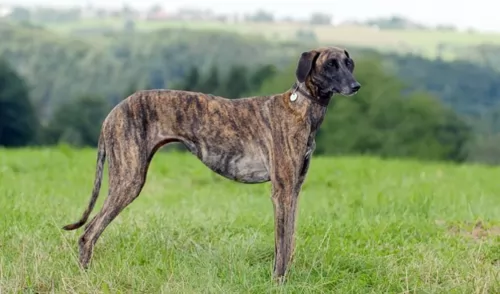 The Sloughi is an ancient dog breed, dating back to the 13th century, and coming from Morocco, North Africa.
The Sloughi is an ancient dog breed, dating back to the 13th century, and coming from Morocco, North Africa.
Much of its history isn’t well known. The dog is a member of the sighthound family. They were originally used for hunting purposes.
The world wars saw their numbers declining. The first Sloughi dog was introduced to the United States in 1973. It was in 1989 that the American Sloughi Association was founded. The dog was also recognized by the American Kennel Club as a Foundation Stock Service breed in 1997. The dog has also been recognized by FCI in the Sighthounds group.
They are rare in the United States and if you wanted to buy one of these dogs you would stand a better chance of looking for a breeder, and then there may be a waiting list.
 This Bichon Frise-Poodle cross is a small dog with big personality. The original hybrid is 50% Poodle and 50% Bichon Frise. This is considered a first-generation hybrid. The second-generation hybrid is 50% Bichonpoo and 50% purebred Bichon Frise or Poodle. Then third generation hybrids are a cross between two second generation dogs. There is no fourth generation and most breeders do not offer even a third generation. The original hybrid can be healthier than the parents, but any flaws tend to show up in 2nd generation hybrids and it gets worse with third generation. This dog should be hardy, well-proportioned and robust. They are small, sweet and sturdy. Because there are three different sizes of Poodles, there can be three different sizes of the Bichon Poo – Standard, Mini and Toy.
This Bichon Frise-Poodle cross is a small dog with big personality. The original hybrid is 50% Poodle and 50% Bichon Frise. This is considered a first-generation hybrid. The second-generation hybrid is 50% Bichonpoo and 50% purebred Bichon Frise or Poodle. Then third generation hybrids are a cross between two second generation dogs. There is no fourth generation and most breeders do not offer even a third generation. The original hybrid can be healthier than the parents, but any flaws tend to show up in 2nd generation hybrids and it gets worse with third generation. This dog should be hardy, well-proportioned and robust. They are small, sweet and sturdy. Because there are three different sizes of Poodles, there can be three different sizes of the Bichon Poo – Standard, Mini and Toy.
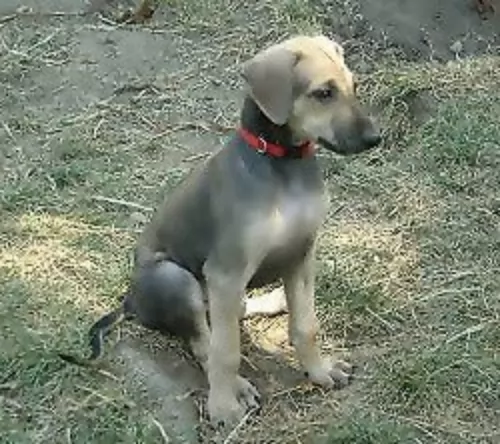 The Sloughi is a big dog, tall and slender. The head is also long and elegant. He stands between 61 and 72cm, both male and female, and he weighs in the region of 18 to 28kg.
The Sloughi is a big dog, tall and slender. The head is also long and elegant. He stands between 61 and 72cm, both male and female, and he weighs in the region of 18 to 28kg.
Looking much like a large Greyhound, the leggy dog has a noble look about him. Known for his hunting skills, he is fast and agile. In fact he is nicknamed the ‘Arabian Greyhound’.
The short straight hair makes him always look well groomed and clean. He sheds moderately throughout the year. Colors of the coat can be a fawn color, sandy, reddish brown or brindle and some come with the black mask and others without. He has medium length floppy ears and a long tail
The Sloughi loves his human family but is essentially a one-person dog. He is affectionate and loyal but can be quite stubborn, Having him trained and socialized does wonders and makes him amicable and well mannered.
He is quiet and intelligent and would prefer to be in a family with older children, and particularly with children who have been taught how to be kind and respectful with animals.
 The Bichonpoo is affectionate, intelligent and active just as you might expect from a Poodle/Bichon Frise cross. He loves people and lives well with other animals. He is particularly fond of children and loves to play with gentle older children. However, the temperament and characteristics of the hybrid are not as predictable as their parents. The characteristics of the Bichonpoo depends upon its lineage – if it is first generation, second generation or third generation. With each successive generation there is less predictability in the characteristics of the individual dog. Regardless of generation, the Bichonpoo will need exercise and mental stimulation. They are loving, good-natured and accommodating to their environment. They want to be with their owner and can get very attached.
The Bichonpoo is affectionate, intelligent and active just as you might expect from a Poodle/Bichon Frise cross. He loves people and lives well with other animals. He is particularly fond of children and loves to play with gentle older children. However, the temperament and characteristics of the hybrid are not as predictable as their parents. The characteristics of the Bichonpoo depends upon its lineage – if it is first generation, second generation or third generation. With each successive generation there is less predictability in the characteristics of the individual dog. Regardless of generation, the Bichonpoo will need exercise and mental stimulation. They are loving, good-natured and accommodating to their environment. They want to be with their owner and can get very attached.
Depending on their parents they can be anxious and high strung like the Poodle or nippiness and ‘small dog syndrome’ of the Bichon Frise. Separation anxiety can be a major issue with this breed. Do not let your Bichonpoo become dominate in your home or they will assume the alpha position and become very bossy, especially with children. He is easy to train and a good watchdog as well.
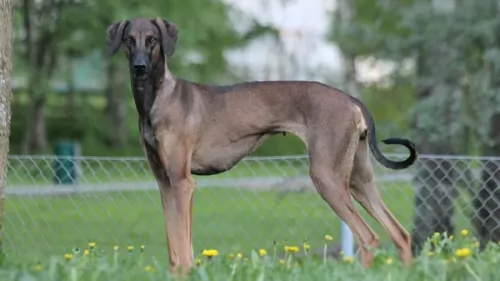 Sloughis are independent, strong willed dogs who will need a firm owner who is consistent, fair and firm.
Sloughis are independent, strong willed dogs who will need a firm owner who is consistent, fair and firm.
They're tall, slender dogs, elegant to look at and low maintenance with their short coats.
They are calm and dignified and when you make one of them your friend, companion and pet, you’re going to enjoy years of devoted companionship and loyalty.
 The Bichonpoo is usually healthier than either the Poodle or the Bichon Frise. At the same time, they could inherit any of health concerns of either of their parents in the first generation Bichonpoo. They are however likely to develop ear infections and skin allergies. Cleaning and grooming is essential, especially the ears, but also to prevent matting which could lead to skin infections.
The Bichonpoo is usually healthier than either the Poodle or the Bichon Frise. At the same time, they could inherit any of health concerns of either of their parents in the first generation Bichonpoo. They are however likely to develop ear infections and skin allergies. Cleaning and grooming is essential, especially the ears, but also to prevent matting which could lead to skin infections.
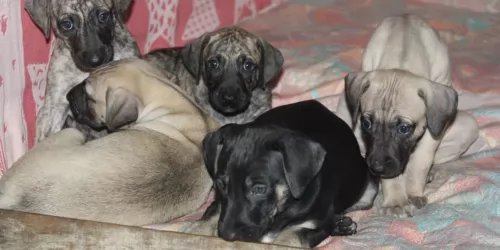 Only a few genetic conditions are found in this breed and these can be the likes of autoimmune disorders such as eye disease, Addison's disease and irritable bowel syndrome.
Only a few genetic conditions are found in this breed and these can be the likes of autoimmune disorders such as eye disease, Addison's disease and irritable bowel syndrome.
These dogs are also sensitive to anesthesia as well as some medications. Other illnesses to look out for with this large dog are cancer, bloat and diabetes.
 The Bichonpoo is an energetic little dog and needs enough nutrition to keep up with his needs. Feed a Bichonpoo at least twice a day – small meals- and dry food because of dental issues. A high-quality food will help to prevent allegories.
The Bichonpoo is an energetic little dog and needs enough nutrition to keep up with his needs. Feed a Bichonpoo at least twice a day – small meals- and dry food because of dental issues. A high-quality food will help to prevent allegories.
The Bichonpoo is the product of the poodle who is prone to bloat and Addison’s Disease and the Bichon Frise who is susceptible to Patella luxation, progressive retinal atrophy and liver shunts. The first generation Bichonpoo should be free of these health concerns. You should be aware that there is a possibility that the first-generation hybrid could contract any of its parents’ illnesses or deficiencies.
This hybrid is a high energy dog and needs daily exercise in the form of walks and play. They have the intelligence and skill of the Poodle with the energetic desire to play of the Bichon Frise. They need toys and a person to play with. She will need to be both mentally and physically stimulated. If she gets bored she will become destructive and noisy with barks and whines.
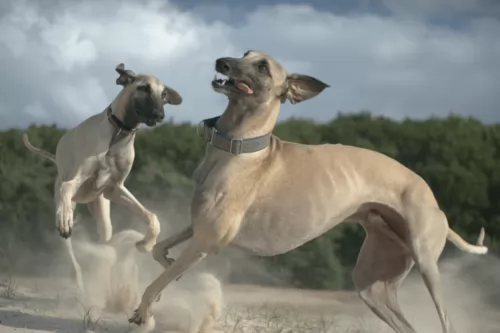 The Sloughi's coat is short and smooth and he also doesn’t have an undercoat. He is looked upon as low maintenance as he just needs a good brush every now and then to rid the coat of loose hairs and to keep him nice and shiny.
The Sloughi's coat is short and smooth and he also doesn’t have an undercoat. He is looked upon as low maintenance as he just needs a good brush every now and then to rid the coat of loose hairs and to keep him nice and shiny.
The Sloughi dog can be fed dry kibble, but it should be a top quality one – one for large, athletic dogs. The dry kibble is useful in that it helps to keep his teeth clean.
To add some tasty variety to your pet’s diet feed him some home made food occasionally. All chopped up, boiled chicken, brown rice or pasta and spinach, sweet potatoes and carrots are a healthy choice for your Sloughi and can be added to the dry kibble. Simple food like this keeps digestive problems at bay.
Try and include some raw meat into the diet as this can help in fighting off horrible skin diseases. Make sure he has constant access to fresh, cool water.
Sloughis love to be active and to have a good run. If you live near a park, allow him off the leash to have a chance to run. Alwys check first though, that it is safe to do so and that your loughi doesn’t try and fight with other dogs off the leashh or accidentally knock over a small child. If you’ve got a big garden, throw a frisbee or ball for him. It is important for him to get a good dose of exercise.